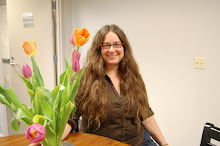When I lived at the Odin a year ago, I felt like a stranger. This time it feels like home. A group house I still belong to.
"There you are," said Lilicherie, as she showed me into the quiet two-bed room just off the music room. There is a shower-room outside mine, and a bathroom beside that. The music room has shining goldwood floors, drums, gongs, and ukeleles, two small worn Persian carpets, Grotowski posters, theatre posters from around the world. "A l'Odin," "Por Odin." During Odin Week, we set up picnic tables and tea stations to make it a dining room.
I can't believe the change in my spine. How relaxed it feels this time. "I need to paint here," I thought as I fell asleep.
Last year, so much in me was getting taken apart in me that I didn't know where it would stop. I was rigid, while disintegrating. When everything matters and you don't know what's important, you absorb it all. Perhaps the way the washcloths are folded is important, when they're taken from the dryer and carried in a small tan plastic basket to the shelf by the redbrick floor. Perhaps the secret lies in the tall narrow hall cupboard where the banquet candles and tea are kept. I grasped onto the tangibles as an anchor against the great intangibles which were destroying me.
Now, my unconscious understands. The way it understands my own home, or Microsoft, or Australia.
"Have you been to the East?" asked Eugenio last time I was here, in that gentle voice which meant you should; you must; you will. Which meant, it is your education and your duty.
An artist, a human who has fully flowered in their Gift, becomes a towering banyon tree. They bring hope, shelter, shade, respite, strength. And yet, they are vulnerable; they grow.
"I am angry," Eugenio said when his friend Sanjukta Panigrahi died, "That we only got the flower of Sunjukta's maturity. We were robbed of the fruits of her old age." He built a high small hexagonal room, windows set high in the wall, on a walkway across from the theatre, called Sanjukta's Tower. It feels like a meditation room. You need a key to enter.
The new CTLS -- Center for Theatre Laboratory Studies -- is on the second floor. Eugenio ordered another tower built, like Sanjukta's -- so you can only enter the Center by first experiencing a climb through a sacred tower. "I am not the architect of this project," said the architect. "Eugenio is." That is as it should be. Eugenio is architecting far more than a building.
It takes a village to raise a child. It takes a world, the focus-lens of a director, the tinder of devotion, the unwavering ethics of focus, the sunfire of intention, and the power of the gods, to raise a theatre. (To raze a theatre?) It takes a theatre to raise an artist. It takes an artist to... create the parables?
Merlyn didn't talk to Wart, the young King Arthur; he turned him into a fish.
My glasses are held together with yellow theatre spike-tape at the right temple. I carry the spike-tape with me, a continual nudge toward self-care. With my second paycheck, I'll get glasses.
Maybe the next time I do a gods-and-mortals play, I'll make the mortals be gods who have forgotten who they are, but retained their powers. Now I understand theatre of the absurd -- Godot is never coming.
I am sitting at the laborante's computer -- "Laborante no more," said Anna, who joined the Odin just before I left. "Mia and Anna are pupils of the Odin now." She travels to the ISTA each year to be the onsite support. That is another spoke in my understanding of a laboratory theatre; of how to sustainably manage international connection. The heavy silkwater-gold fabric I gave the other Anna a year ago is pinned to the bookshelf, theatre-curtaining it. Beside me, Pushpa arranges papers at his small desk. Sigrid, who has done Odin finances for 23 years, came in to catch up with her morning cigarette. Soft Danish lilts through the theatre, and someone has made coffee. The workday has begun.
Without Eugenio and the actors, this is a different place. I wanted to experience this. "Light is the left-hand of darkness," say the Oshthregor, "Darkness the right hand of light." They are surprised I've come, and pleased.
"Jesus spoke in parables so the people could not understand," Jim Rapson says. "They have to go find the meaning themselves. That's how it becomes theirs." Ursula LeGuin's Left Hand of Darkness is such a parable. So is the Odin.
The tibetan buddhists say the great masters hid secrets down the timestream. So when a great spirit is born, it can open the secret at the right time.
Sunday, May 01, 2005
Subscribe to:
Post Comments (Atom)

1 comment:
When something is right, it's really right. I believe that for you, this is right.
Without wax,
-T
Post a Comment